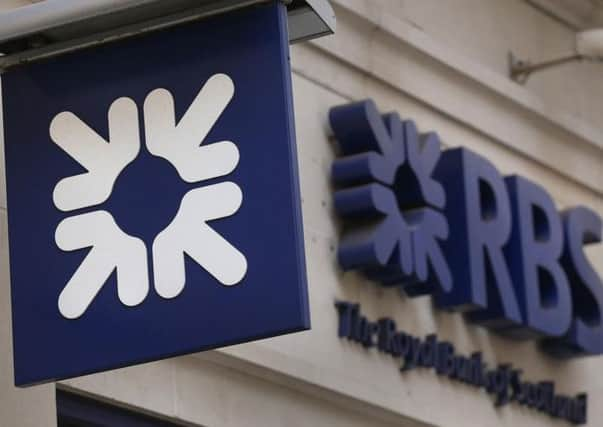Hammond accused of RBS fire sale to pay for Brexit


The Treasury revealed plans to raise £15 billion by selling off two thirds of its stake in the bailed-out bank, despite RBS’ share price sitting at half value the government paid.
Revenue from the sell-off represents almost two-thirds of a £25 billion stimulus package announced by the Chancellor, as he loosened the purse strings to combat gloomy economic data showing Brexit will wipe a quarter off growth rates over the next five years.
Advertisement
Hide AdAdvertisement
Hide AdSNP Westminster leader Ian Blackford said it was the wrong time for a “fire sale” of the public’s share in RBS, and former business secretary Sir Vince Cable called the move “rather desperate”.
It comes just eight months after the government said it was too soon to sell off more shares in the bank because RBS was still dealing with “legacy issues”.
The bank headquartered in Edinburgh is awaiting a multi-billion dollar fine from US regulators over mis-selling of payment protection insurance, and is fighting claims that a business restructuring division exploited its own clients to asset-strip their companies.
Shares will start being offloaded by March 2019. At current prices, the government would make a £26bn loss on its 71% shareholding. In April, Mr Hammond told MPs that he had to “live in the real world” and that fair value “could well be below what the previous government paid”.
At the March budget, the Treasury stated that “the need to resolve legacy issues makes it uncertain as to when [sales] will occur.” Wednesday’s budget document states: “RBS has made significant progress on resolving its legacy issues and refocusing on serving British businesses and consumers.”
In his budget speech, the Chancellor insisted the UK economy was strong and would “confound those who seek to talk it down”.
But Paul Johnson, the director of the Institute for Fiscal Studies, said the downgrading of growth forecasts meant the UK economy would be £65bn smaller by 2020 compared with expectations in 2016.
Mr Hammond told MPs he would use the “fiscal headroom” he gave himself by not paying off the UK’s debt until the middle of the next decade to invest in trying to boost productivity.
Advertisement
Hide AdAdvertisement
Hide AdHe put aside £3 billion to pay for physical infrastructure at the border, pleasing Leave-supporting backbenchers in his own party who had accused the Chancellor of refusing to plan for a no-deal scenario.
There was a major announcement for millennials struggling to get on the property market as the the Conservatives try to win back young voters from Labour, with the Chancellor abolishing stamp duty in England and Wales for first time buyers on house purchases up to £300,000.
However, the OBR said the move would simply push up house prices, with current owners expected to pocket double the value of the stamp duty relief on the sale price of their property.
Control of Land and Buildings Transaction Tax is devolved to Scotland, where first time buyers making an offer on a £200,000 property will now pay £1,100 more tax than south of the border. Ruth Davidson and several Scottish Tory MPs called on SNP Finance Secretary Derek Mackay to consider adopting the measure when he delivers his budget next month.
Mr Hammond bowed to pressure from across the political spectrum to ease the hardship faced by some of the poorest families because of the government’s reforms to benefits.
The Chancellor said waiting times for initial payments of Universal Credit would be cut from six weeks to five, and £1.5bn invested so that new claimants can get an advance on the next month’s benefit within five days of making a request.
The repayment period for advances will also be extended from six to 12 months. Further detail of changes to the controversial reform will be revealed on Thursday.
“Universal Credit delivers a modern welfare system, where work always pays and people are supported to earn,” Mr Hammond said.
Advertisement
Hide AdAdvertisement
Hide Ad“But I recognise the genuine concerns on both sides of the House about the operational delivery of this benefit.”
Unions accused the Chancellor of “letting down” millions of public sector workers in England and Wales, with no commitment to lift the pay cap in the budget.
Mr Hammond said NHS staff would only get a pay rise if productivity improved before the next round of pay reviews in spring and summer, and there was no offer at all for council workers, civil servants and teachers.